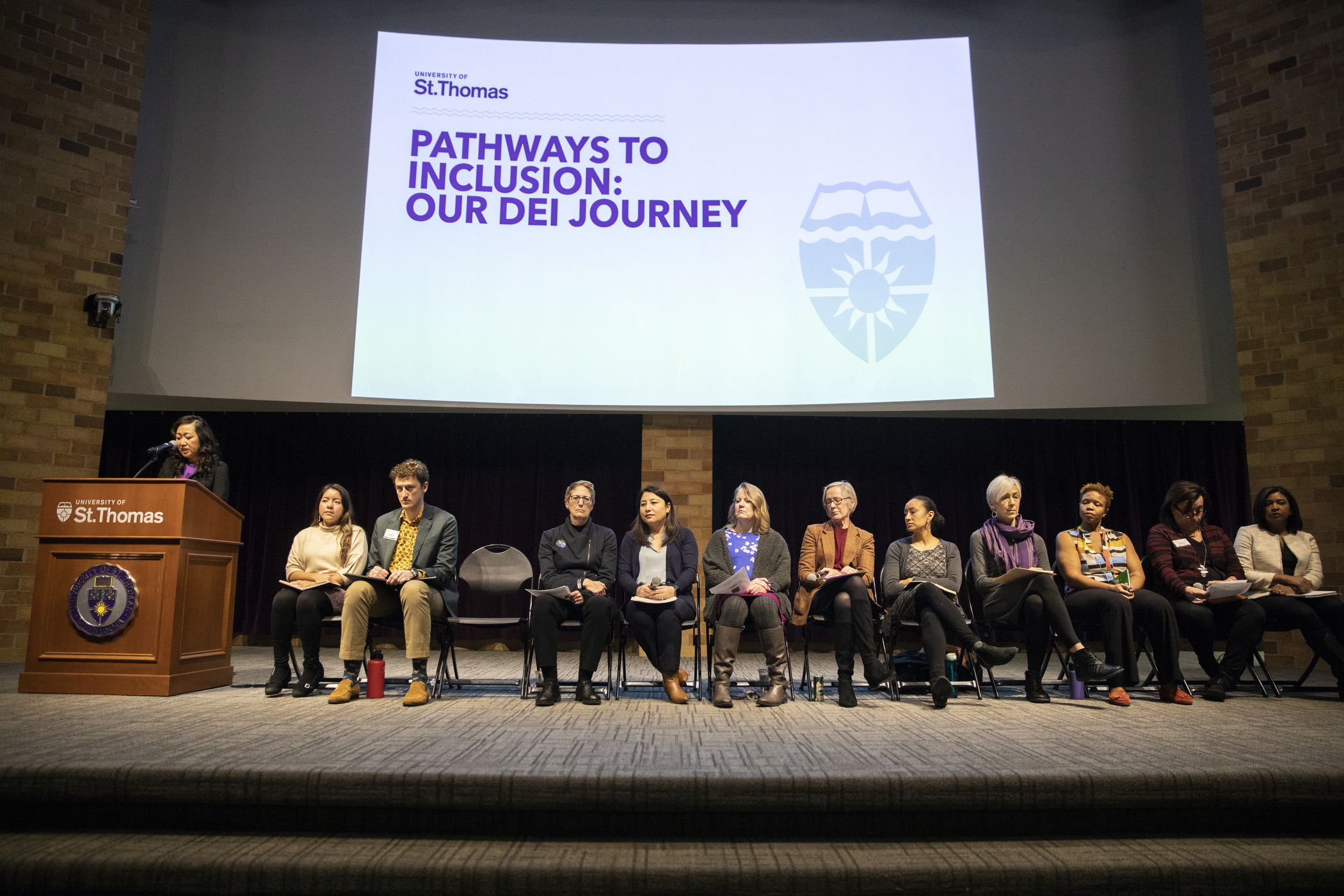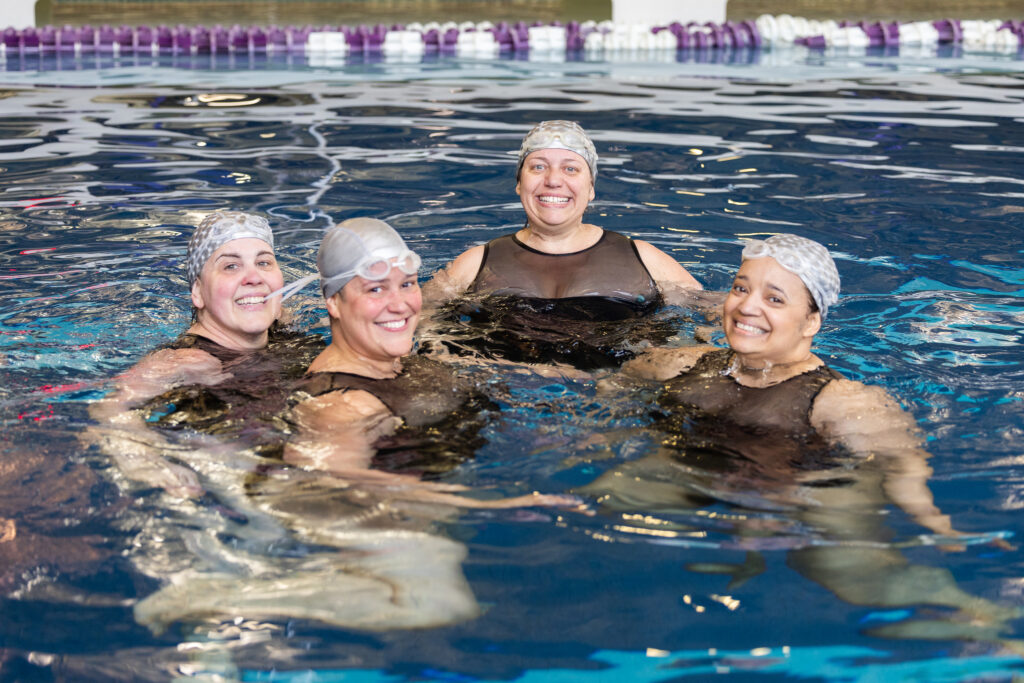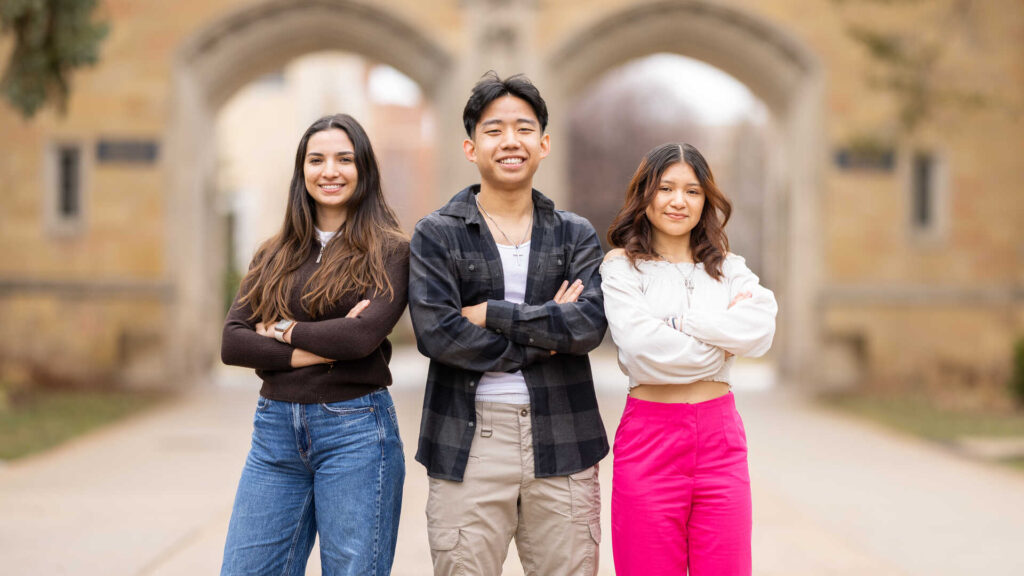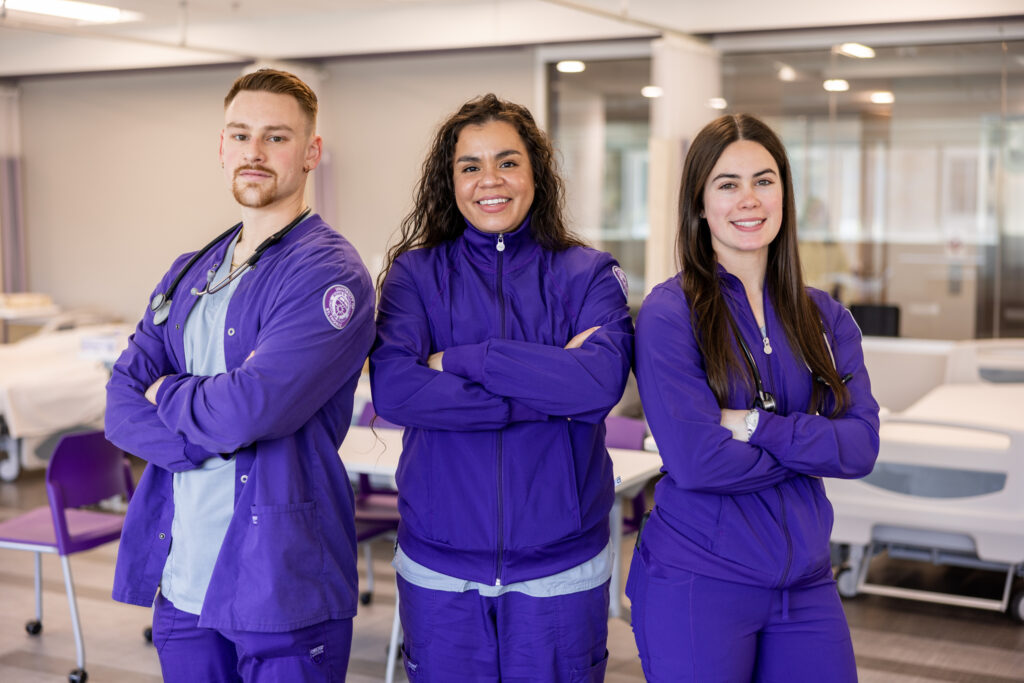Nearly 150 community members gathered Tuesday in O'Shaughnessy Educational Center auditorium for “Pathways to Inclusion: Our DEI Journey,” a 12-person panel discussion hosted by Associate Vice President for Inclusive Excellence Kha Yang and the Office for Diversity and Inclusion.
The panel included students, faculty and staff, and the conversation gave opportunity to share both accomplishments and challenges around diversity, equity and inclusion over the past year and beyond.
“Many have reached out to me to ask, ‘Where are we at? Is this action plan really working? Are we becoming a more inclusive environment?’ My short answer would be yes and no. That’s the reality of this work,” Yang said. “It’s a lifelong journey. There will be days where we look at strides … and days where we look and realize there is so much to be done in this space.”
Yang announced a campus climate survey will be distributed to all St. Thomas community members during fall semester, and that an external vendor will be contracted to facilitate a campus audit.
“We are committed to transparency [throughout the campus climate survey process], that as the data is collected we will share it and allow people to share their opinions,” Yang said. “All of this will inform the university’s diversity, equity and inclusion strategic plan. This will include themes, measurable goals and objectives for the next three to five years.”
“One of the things that has inspired me and most proud of our university has been the intense commitment I’ve seen to this journey, particularly over the past 12 months,” President Julie Sullivan said in her opening remarks. “It is a journey, and we need each other to successfully make it. There is really no end to the journey; success is staying committed.”
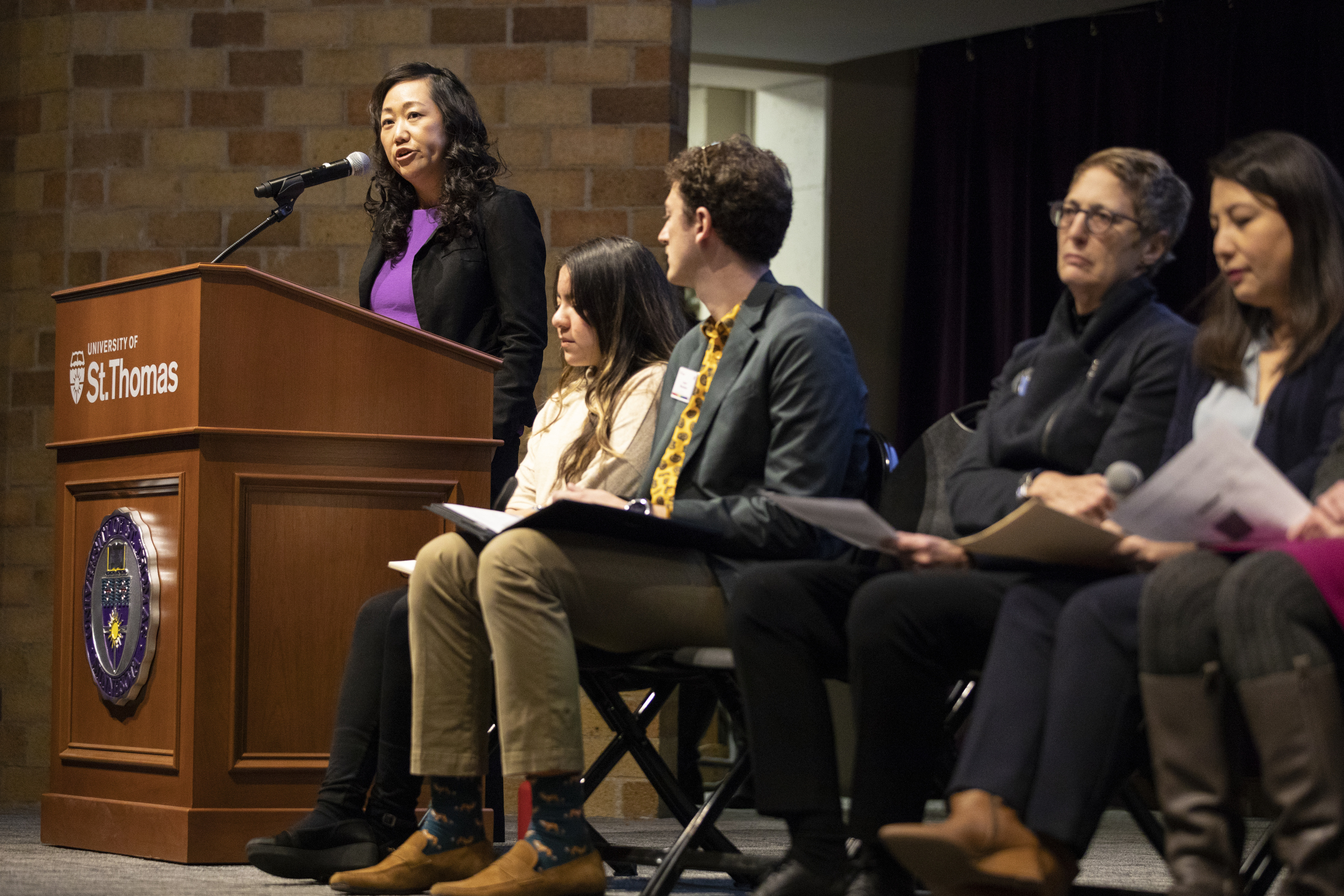
Associate Vice President of Inclusive Excellence Kha Yang welcomes the audience during the DEI Journey panel. (Liam Doyle/University of St. Thomas)
Many perspectives
The panel featured a wide range of community members:
- Logan Monahan, Undergraduate Student Government president
- Viridiana Arevalo Martinez, Undergraduate Student Government vice president of diversity
- Kha Yang, associate vice president for inclusive excellence
- Stefanie Lenway, dean of Opus College of Business
- MayKao Hang, vice president, founding dean and Morrison Family Chair, Morrison Family College of Health
- Michelle Thom, associate vice president of human resources
- Ann Johnson, associate vice president for faculty advancement
- Bryana French, associate professor of psychology and Faculty Development DEI Fellow
- Melissa Loe, associate professor of mathematics
- Nakeisha Lewis, Opus College of Business associate professor, marketing department chair and Faculty Development DEI Fellow
- Patricia Conde-Brooks, executive director for campus inclusion and community
- Kathlene Holmes Campbell, dean of School of Education
Many themes emerged across the conversation, including the need for everyone to be willing to engage on an individual level and as a community, and for our university to be honest about the journey it’s on in relation to its reputation to those outside St. Thomas.
“The difference we have in the last few years is people humbly showing up to the table and saying, ‘We’re wrong, but we’re willing to learn.’ When you have that humble approach and leadership saying we can do better, that’s when you have change,” Conde-Brooks said. “We can do better, but I have seen enormous change at St. Thomas.”
French pointed out the importance of doing the work “first and then rebuild the trust in the community. If we can focus on how we create a space where people can show up authentically as opposed to assimilating into the culture of St. Thomas … that should be our focus, as opposed to how we change the perception, so we can earn the trust of marginalized communities.”
Hang said the perception of what’s happening at St. Thomas will change as more people’s experiences here change.
“You can do great marketing, but the people who experience St. Thomas are the most important ambassadors,” she said. “Regardless of what we say out there, if it’s not true in here it’s going to be a false brand, and people will know that. The work of the DEI journey is everyone’s; it’s our collective action together.”
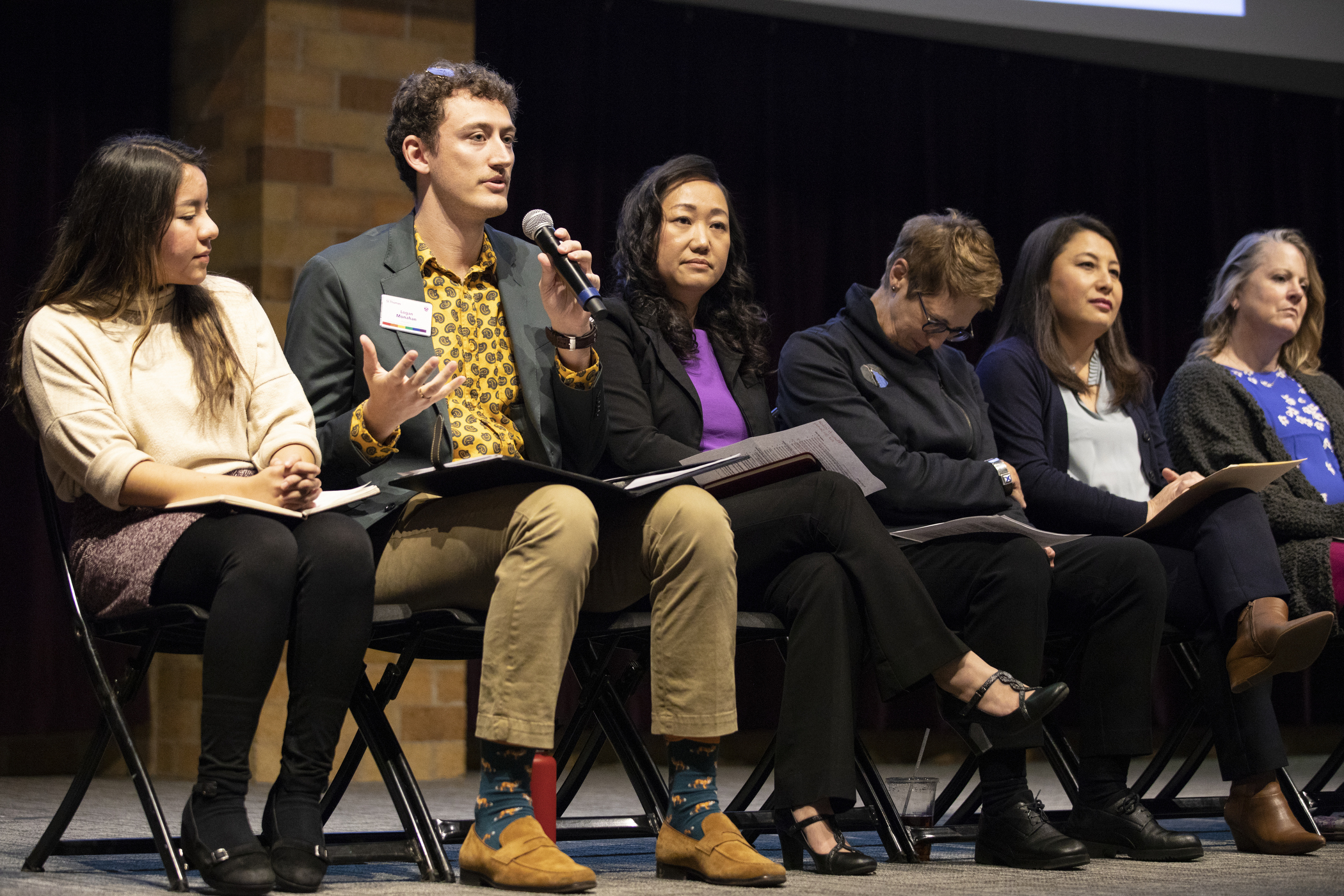
Undergraduate Student Government President Logan Monahan talks about the importance of his own personal journey. (Liam Doyle/University of St. Thomas)
Progress
All 12 panelists shared why their own personal diversity, equity and inclusion journey is important to them, and conversation followed on the questions of what successes they’ve seen in the past year at St. Thomas and what opportunities they view as most needing attention.
A huge range of efforts and activity were highlighted as panelists discussed growth in areas of St. Thomas becoming more inclusive. Those included:
- “My group and DFC came together in August and started to look at the syllabi to make sure we have culturally sustaining pedagogy in every course,” Campbell said. “It should be in everything we do.”
- “Within two weeks of the action plan we created the action plan oversight subcommittee … and it has really developed into this great group that meets with all the administration frequently and is holding them accountable, but is also really collaborating,” Monahan said. “The majority of this affects students at St. Thomas; students need to be in these meetings making sure the work is going to reflect and help them.”
- Thom spoke about the Seeking Educational Equity and Diversity (SEED) program, “A national effort several of us were trained to bring back to St. Thomas. We get together as a cohort, share stories about our identities ... and use those conversations to build trusting relationships, then work together to identify system barriers that need to be taken down at the University of St. Thomas. … By the end of the academic year we’ll have graduated 100 people.”
- “I am one of the DEI fellows for faculty development,” Lewis said. “The fact the university was willing to create these positions is a success.”
- “The changing demographics of students coming into the Intercultural Center and to our events. … I look around the room and it’s majority white students that are attending. … More and more students are wanting to engage, growing their own identity, engaging their whiteness and white fragility,” Conde-Brooks said, also pointing to the recent hiring of Alex Hernandez-Siegel as the new director of student diversity and inclusion services as an important step in the evolution of diversity, equity and inclusion programming at St. Thomas.
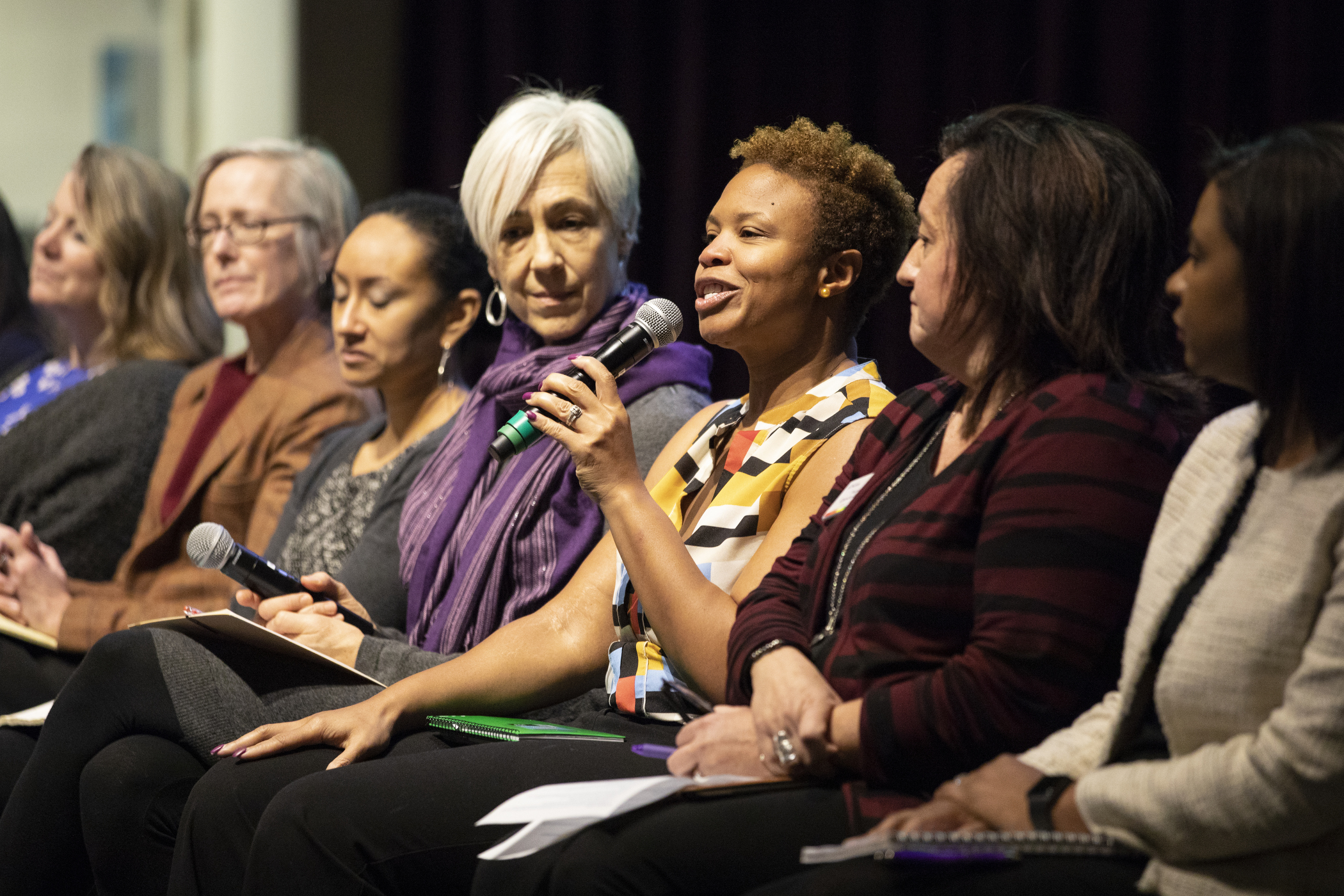
Nakeisha Lewis, Opus College of Business associate professor, marketing department chair and Faculty Development DEI Fellow, speaks during the DEI Journey panel discussion. (Liam Doyle/University of St. Thomas.)
Opportunities
Many panelists addressed continuing challenges they see and what opportunities can come in addressing them.
- “There will always be resentment and people who feel not enough is being done,” Martinez said. “I personally decided to help bridge that by going to student club meetings and showing what is happening on campus. … I hope this will help students grasp the bigger things we’re doing. Students are still very upset.”
- “Student Affairs and academics seem opposite as far as these issues,” Monahan said. “Making sure the messages Student Affairs are giving that everyone is welcome and furthering these initiatives … and you go to the classroom and have many faculty not acknowledging this. There’s a gap there.”
- “The challenge and the opportunity is to see DEI as not an initiative, but true to our tradition and what we do. I believe we can do that,” Hang said. “It’s all of our jobs.”
- “We’ve made a lot of progress with faculty, which is great. A challenge is size. We have 450 full-time faculty, 400 adjunct faculty. Reaching all those faculty is a big challenge,” Johnson said. “Another opportunity we have is to align our faculty evaluation practices with our DEI goals. Right now, they’re not consistently lined up.”
- “In STEM fields, students of color drop out at twice the rate white students do. They earn degrees here still, but not in STEM. There are powerful things happening here in STEM that need to change,” Loe said, pointing to the work stemming from last year’s securing of a a $1 million grant from the Howard Hughes Medical Institute (HHMI) to support efforts to engage all students in science. “One prong is faculty development … The second prong is with advising and mentoring of students. … The third prong is transformational change of the university and STEM.”
Yang said afterward she felt “energized and inspired” by everything discussed before observing how siloed work around diversity, equity and inclusion at St. Thomas can seem.
“The key goal I’d like to see is [articulating] the core impact of all this,” she added. “How do we align all these initiatives so we really see the change that’s occurring?”
Audience members asked questions about the challenge of hiring and retaining employees of color, as well as the challenge of people outside of St. Thomas perceiving it as a not inclusive community.
“We do have a reputation out there and the community knows it. We have work to do in our community understanding we are an inclusive place not only to study, but to work,” Thom said. “Where I get more concerned is on the retention side. … We turn over more of our employees who identify as people of color than white employees. … That fact is concerning and something we need to do more work on. There are best practices we’re looking at, such as mentorship or buddy programs for employees of color, specific barriers employees of color face.”
Provost Richard Plumb closed the event and thanked the panel and audience members for their individual and collective work to make St. Thomas a more diverse, equitable and inclusive university.
“We’re called to help one another with the experiences we bring, the privileges we’ve had, the shortcomings we’ve encountered. We’re in this together. It’s a personal journey, but a communal journey,” he said. "My challenge to you is to go out and talk to someone you don’t normally talk to, ask them about their journeys, and see if you can support them."
